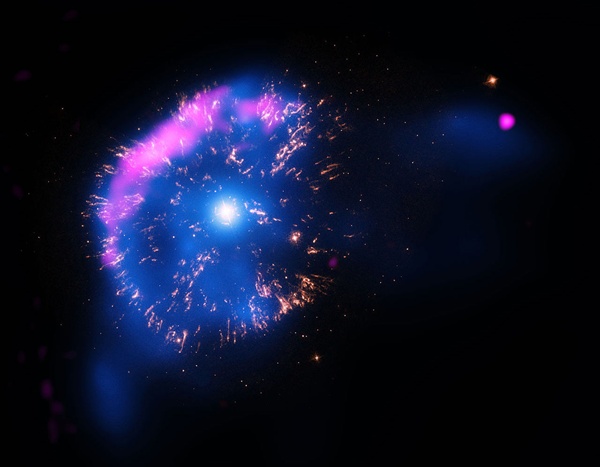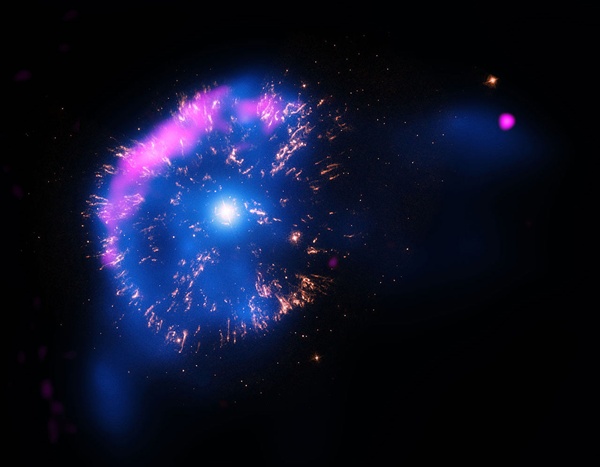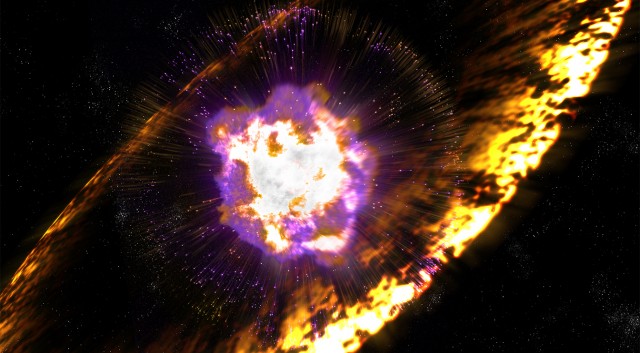Scientists Discovered A Star Exploding Every Year
Indira Datta - Apr 30, 2019

Scientists have discovered a star in the Andromeda Galaxy that explodes every year — the first of its kind in the known universe.
- Top 14 Of The Worst Industrial Disasters In The World
- Satellite Images Show The Terrifying Aftermath Of Beirut Explosion
- This Exoplanet Pours Down Iron When It Gets Rainy
A new study recently discovered a star located in the Andromeda Galaxy which explodes annually. In a press release, Allen Shafter, an astrophysicist from San Diego State University, said:


Shafter and his colleagues report on the strange star in a publishment in the journal Nature.
According to the study, the annual explosion of the M31N 2008-12a is influenced by another star nearby. It takes in hydrogen from this neighboring star. When the hydrogen reaches the surface of the M31N 2008-12a, it gets heated and compressed. The hydrogen then transforms into helium. That is why an explosion happens since this whole process releases a great amount of energy. And it is repeated once a year. The continuous explosions of this star have created a surplus that stretches over 400 light-years across.
Astronomers believe that this star is about to go through a supernova explosion. This explosion will destroy itself. It will give scientists the opportunity to study the activities causing a supernova.

While darkness is one of the biggest obstacles that make it difficult for people to study more about the universe, a supernova can help us solve this problem. Because the explosion will produce a huge amount of light to help us map what we can see in the universe with an extremely high accuracy of distance. This is an opportunity for people to study and understand more about the development and change of the universe over time. Even so, researchers have not been able to determine the origin of the stars.
Currently, Shafter's research team is focusing on determining whether super-remnants like the M31N 2008-12a happen randomly or under some kind of rules. If they really follow the rules or appear commonly, then the likelihood of us detecting and following them will be improved in the future.
Featured Stories

ICT News - Feb 18, 2026
Google's Project Toscana: Elevating Pixel Face Unlock to Rival Apple's Face ID

Mobile - Feb 16, 2026
Xiaomi Launches Affordable Tracker to Compete with Apple's AirTag

ICT News - Feb 15, 2026
X Platform Poised to Introduce In-App Crypto and Stock Trading Soon

ICT News - Feb 13, 2026
Elon Musk Pivots: SpaceX Prioritizes Lunar Metropolis Over Martian Colony

ICT News - Feb 10, 2026
Discord's Teen Safety Sham: Why This Data Leak Magnet Isn't Worth Your Trust...

ICT News - Feb 09, 2026
PS6 Rumors: Game-Changing Specs Poised to Transform Console Play

ICT News - Feb 08, 2026
Is Elon Musk on the Path to Becoming the World's First Trillionaire?

ICT News - Feb 07, 2026
NVIDIA's Gaming GPU Drought: No New Releases in 2026 as AI Takes Priority

ICT News - Feb 06, 2026
Elon Musk Clarifies: No Starlink Phone in Development at SpaceX

ICT News - Feb 03, 2026
Elon Musk's SpaceX Acquires xAI in Landmark $1.25 Trillion Merger
Read more

Mobile- Feb 16, 2026
Xiaomi Launches Affordable Tracker to Compete with Apple's AirTag
For users tired of ecosystem lock-in or high prices, the Xiaomi Tag represents a compelling, no-frills option that delivers core functionality at a fraction of the cost.

Mobile- Feb 17, 2026
Anticipating the Samsung Galaxy S26 and S26+: Key Rumors and Specs
The Samsung Galaxy S26 series is on the horizon, sparking excitement among tech enthusiasts.

ICT News- Feb 18, 2026
Google's Project Toscana: Elevating Pixel Face Unlock to Rival Apple's Face ID
As the smartphone landscape evolves, Google's push toward superior face unlock technology underscores its ambition to close the gap with Apple in user security and convenience.
Comments
Sort by Newest | Popular